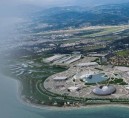SCIPS – Solar Cooling Implementation
Solar Cooling Implementation in South-East Europe (Intelligent Energy Europe), 2008
The project SCIPS will promote solar thermal cooling technologies including solar combination heating/cooling/hot water systems in Southeast Europe.
The aim of the project was to ensure an effective transfer of knowledge and best practice in terms of technology, policy, promotion and implementation in Europe – specifically in Slovenia, Croatia, Bulgaria and Romania – by neighboring Member States with strong markets in solar thermal technologies such as Greece, Austria and Italy.
While the space cooling demand in the 4 target countries is still small compared to other southern and central European countries, rapid economic growth would result in strong market uptake of conditioned space in the next decades. The SCIPS project aimed to secure solar cooling technology growth in this market.
Furthermore, it targeted building owners, architects, engineers and installers of cooling devices on the one hand and policy makers on the other. Key market actors including solar thermal industry representatives and trade organizations have participated in Workshops and Action Plan development. A final European Workshop addressed the common concerns of South-east European countries with regards to market support for solar cooling technologies.
The key long term goal is the market uptake of solar thermal technologies including solar cooling and combination heating/cooling/hot water systems as a sustainable means to increase the RE share in the building sector. Other long term goals include the initiation of a sustainable process to influence consumers´ and building professionals´ choices concerning building heating and cooling systems through capacity and confidence building.










